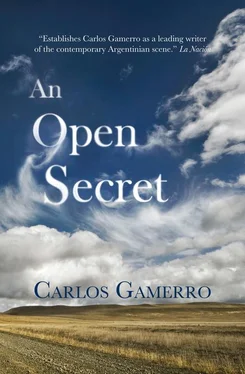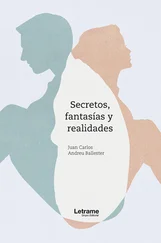GUIDO’S mortally offended.
“Why didn’t you tell me? Don’t you trust me?”
I prop myself up slightly in bed and adjust my pillows. I could murder a cigarette.
“Maybe at first. I decided not to tell anyone, and I stuck to my plan. Then it got to be the other way round. I was frightened by your loyalty. At the first bad word against Darío Ezcurra, or Delia … If you’d known who they were to me, you’d have leapt to their defence, to my defence, you’d’ve given me away. Guido, a drunk who raised his voice to me, you broke three of his ribs. What more can I tell you?” He grumbles but then relents. Perhaps because it’s sincere my explanation seems to satisfy him.
“So when did you realise?” he asks.
“When Mamá died. I found a letter she’d started writing when I was going through her stuff. In her third-grade schoolgirl handwriting balanced precariously on the lines. Dear Darío, it began. I knew she’d gone on writing letters to the town, she sometimes even used to give me them to post, sealed of course — she never let me read them. Your grandmother’ll get angry she used to say, and I accepted the explanation without asking; even when she spoke about God He sounded like someone you had to obey because otherwise my grandparents’d get angry. The names never varied much — Emily, Celia, Darío … She spent over thirty years writing to a man who never replied, the last twenty because he was dead of course.”
Guido listens. It’s my turn to do the talking now.
“It’s a simple story actually. Ezcurra was banging the village idiot. An idiot and a virgin at twenty-two. Screwed her regularly he did, couldn’t be easier, till he began to notice she was putting on weight around the waistline. When my grandparents noticed too they dragged her into the car and never stopped till they got to Buenos Aires, where they found her a place at Don Alberto’s, a friend of the family who owed my grandfather more favours than he could pay back in a lifetime. He agreed to give me his surname, and I grew up calling him Papá. Mamá and I lived in one of the apartments down the corridor from Don Alberto’s which they rented out; Don Alberto lived in the house at the front with his real children and his wife. Anyway he treated Mamá and me like his own children, and received the money my grandparents sent for our expenses. Mamá was banned from ever going back to town in case she let the cat out of the bag, and me every summer when I arrived they briefed me about what I was supposed to say. And when I got back Mamá’d drive me crazy, asking me to tell her about everyone, every detail of what had changed, what was the same. I can’t say it was bad, growing up with her, but it was strange. She was more like a sister than a mother. An idiot sister. She liked to read Mafalda but didn’t get most of the jokes. I’d watch her, concentrating, scanning the bubbles, following the words with her finger and moulding them letter by letter with her lips. When she realised I was there she’d look up and smile and ask me will you explain for me Fefe? After Felipe, her favourite character was Guille. I’ve only just realised, it’s my son’s name too. It’s a pity, she couldn’t enjoy him more — she’d’ve made a great grandmother. They were difficult the last few months, because she didn’t understand. It hurts Fefe! My belly hurts! She’d clutch it and weep like a little girl — it was the cancer that killed her. A few weeks after the funeral, when I found the letter, I decided I’d gone long enough without knowing. My first attempt failed, as you know — the night before I left I couldn’t get a wink of sleep and by the morning I was running a temperature of nearly forty. My second attempt was a success — I went to Rosario and put my grandmother between the letter and the deep blue sea for starters. I hadn’t seen much of her over the last few years — after I got back from the Malvinas my life was erratic to say the least — and the woman I remembered as being impenetrable as a closed convent wall had become a doddery little old lady, all smiles, and I didn’t have to twist her arm to get her to come clean. I can see clearly now that my grandparents’d never been that formidable, except in Mamá’s and my impressionable imaginations. They’d had her late in life, and when they realised she’d turned out … The only daughter of a couple of tired old folk choking on the anger of not being able to show their hatred of Ezcurra publicly — and Ezcurra, aware of this, revelled in it all the more — no room left in their hearts for any other feeling for the man who was after all … She’s one of those who thinks Ezcurra isn’t dead my grandmother — she needs him alive the better to indulge her anger and grief. For her the crafty devil’s living in Brazil with a black woman and coffee-coloured kids — any day now, she assured me again at the terminal in Rosario when I went to take the coach that brought me here, he’ll be back in town to visit, with Garotos for everyone, end of story.
“IT WAS A BET,” says the Professor.
“A what?” I ask.
“A bet between the Superintendent and the colonel. According to the Superintendent, it was the other’s idea and he accepted because he was certain of winning. They both promised not to cheat, gave their words of honour — the Superintendent to carry out his duty if, as the colonel contended, it turned out to be a piece of cake; the colonel to shelve the whole affair if the Superintendent found that the town’s inhabitants refused to cooperate. And his subordinate, Greco — although the Superintendent had no idea — was to be the secret referee and make sure fair play was observed. So the terms of the contest were formalised. I don’t need to tell you how it turned out,” says Professor Gagliardi, as the afternoon light dissolves amongst the books in his room. “That’s why the Superintendent was so dejected at our last meeting. The town had failed him, we’d made him lose the bet. He’d had faith in this town, with its stories of struggle and resistance — and we’d let him down. We hadn’t lived up to our own legend. Worse still, we’d made him look bad. His friend, the colonel, took the mickey on the phone now. That’s why he’d decided to leave he told me. He spoke softly, staring into space. As if he’d lost his faith not just in Malihuel but humanity. The Superintendent, I realised that day, had survived his whole life on a strange kind of faith — the faith that others, people, were better than he was. A convenient kind of faith that exempted him from any personal responsibility. You should all’ve stopped me was his way of answering the reproach. The Superintendent was an idealist at heart, and there’s no more desperate cynicism than that of a failed idealist. It was an odd situation, no doubt about it. For a while Malihuel became the theatre of a curious human experiment conducted rather cack-handedly by its chief of police. But the results are plain to see. You can make the equation as complex as you like, all imaginable variants can be included, but the result will always be the same — Ezcurra dead at the bottom of the lagoon.” The professor, a greying shadow in the half light, approaches the lamp, which he switches on with sharp tug on the thin chain of tiny bronze globes. The entire room spins and folds in on itself, then organises itself around the new centre of the gleaming lampshade. My feet have frozen inside my shoes with the immobility and the cold, which the quartz heater is incapable of keeping at bay. “He was a contemptible man the Superintendent, in the most precise meaning of the word. He approached people for what was worst in them, and he always found what he’d gone looking for. The dead part of the heart, where all the meanness, baseness, laid down by the years is stored, that’s what he spoke to — and of course his words always found a sympathetic ear.”
Читать дальше












